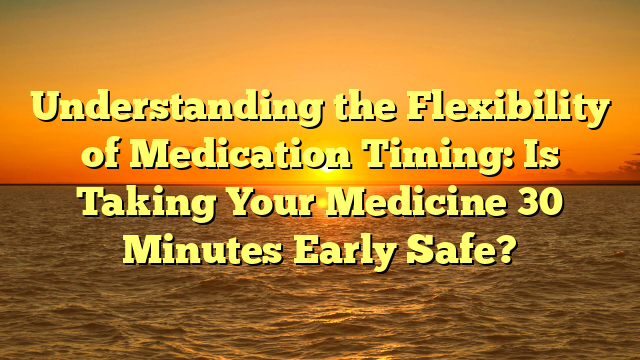Understanding the Flexibility of Medication Timing: Is Taking Your Medicine 30 Minutes Early Safe?
Introduction
Taking medication at the right time is crucial for its effectiveness. However, sometimes we may need to take our medication earlier or later than the prescribed time due to various reasons. This raises the question of whether taking medication 30 minutes early is safe or not. In this article, we will explore the flexibility of medication timing and its safety implications.
Why Do We Need to Take Medication at the Right Time?
Medication timing is important because it affects the way the medication is absorbed and metabolized in our body. Taking medication at the right time ensures that the medication reaches its peak concentration in the bloodstream when it is needed the most. For example, taking a painkiller before the pain becomes unbearable will provide better pain relief than taking it after the pain has already set in.
Factors That Affect Medication Timing
There are several factors that can affect medication timing, such as:
- The type of medication
- The dosage
- The frequency of administration
- The time of day
- The presence of food in the stomach
- The individual’s metabolism
Is Taking Medication 30 Minutes Early Safe?
In general, taking medication 30 minutes early is safe as long as it does not interfere with the medication’s effectiveness or cause any adverse effects. However, this may not be true for all medications. Some medications have a narrow therapeutic window, which means that the difference between the effective dose and the toxic dose is small. Taking these medications too early or too late can lead to suboptimal therapeutic outcomes or even toxicity.
Examples of Medications with a Narrow Therapeutic Window
| Medication | Therapeutic Range |
|---|---|
| Warfarin | INR 2.0-3.0 |
| Digoxin | 0.5-2.0 ng/mL |
| Lithium | 0.6-1.2 mmol/L |
When Is It Okay to Take Medication Early?
There are certain situations where taking medication early may be necessary or beneficial, such as:
- When the individual has a busy schedule and may forget to take the medication at the prescribed time
- When the individual is traveling across time zones and needs to adjust their medication schedule accordingly
- When the individual is experiencing breakthrough symptoms and needs immediate relief
- When the medication needs to be taken with food and the individual is about to have a meal
When Should You Avoid Taking Medication Early?
There are also situations where taking medication early should be avoided, such as:
- When the medication has a narrow therapeutic window
- When the medication needs to be taken at a specific time to coincide with the body’s natural rhythms
- When the medication needs to be taken on an empty stomach
- When the medication interacts with other medications or supplements
What Should You Do If You Accidentally Take Medication Early?
If you accidentally take medication 30 minutes early, it is unlikely to cause any harm. However, if you take medication too early or too late, it is important to inform your healthcare provider. They can advise you on what to do next, such as adjusting the medication schedule or monitoring for any adverse effects.
Conclusion
In conclusion, taking medication 30 minutes early is generally safe as long as it does not interfere with the medication’s effectiveness or cause any adverse effects. However, it is important to consider the type of medication, the dosage, the frequency of administration, the time of day, the presence of food in the stomach, and the individual’s metabolism when adjusting medication timing. If you have any concerns about taking medication early, it is best to consult your healthcare provider.











